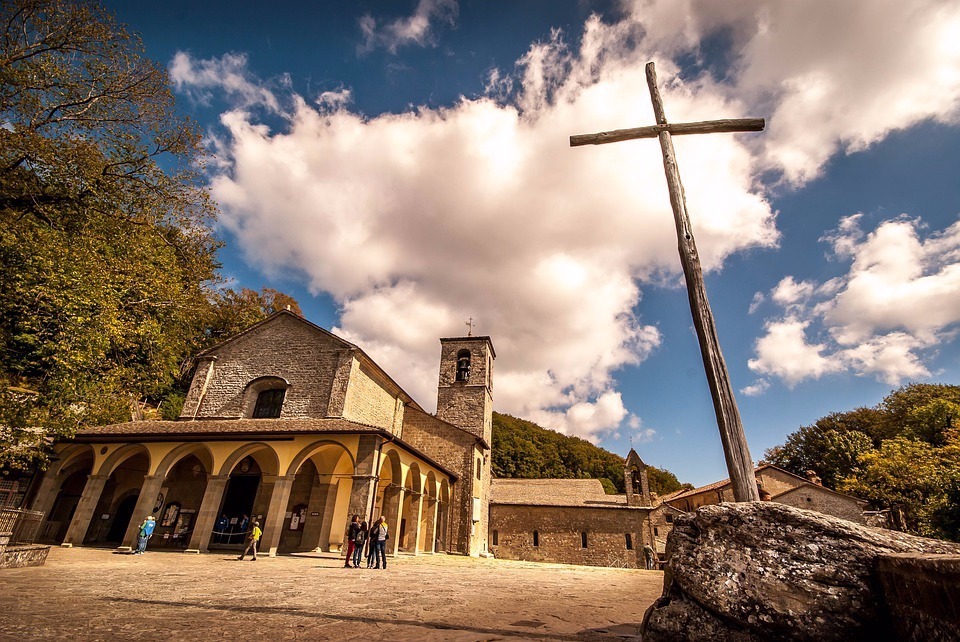
All over the world, religious services are coming to a halt in order to contain the spread of Covid-19. The Church of England has suspended all services and the same decision was taken by local Catholic and Protestant dioceses across the United States . Since early March, synagogues around the world have been closing and many countries including the United Arab Emirates, Turkey and Saudi Arabia have shut down mosques to contain the virus.
In Greece, the arrival of the virus has coincided with the period of peak church attendance. Easter, in the Greek Orthodox Faith, is the most important time of year, often called the “Celebration of Celebrations.” Sarakosti, the forty-day Greek Orthodox Lent, is a rigid regime of fastening and prayer commemorating Christianity’s survival through hardship and preparing believers for Easter. It is the time of the year when believers confront all spiritual matters of their faith. It began in early March, days after the first Covid-19 infection was confirmed.
Most Orthodox priests in Greece responded by instructing their flock to stay home and practice their faith privately, listening to the advice of medical experts. But a hardline part of the Greek Orthodox Church, which is known for frequent public intervention in controversial issues such as immigration, secularism and even mainstream politics, aided by conservative politicians, resisted taking any such measures. They were supported by many MPs and ministers from the governing New Democracy party, who advocated publicly in favor of Holy Communion and attacked those who called for people to listen to the advice of medical experts and stop it as “atheists”.
By mid-March, however, more than 250 people had been diagnosed with Covid-19 in Greece. The first to have died, a 66-year-old man in Patras, had contracted the virus on a trip to the Holy Land and Mount Sinai. Medical experts fear how resilient the country’s healthcare will prove as the numbers keep on going up. A demi-quarantine has been declared by the government. Private beaches, cruise ship ports and the borders with Albania and North Macedonia are all closed.
On the 16th of March, the convention of the Holy Synod of Greece came out with the recommendation towards believers to pray at their homes and a decision to recall all marriages and everyday service. However, they stopped short of Sunday mass.
Orthodox believers will understand that – and Catholics will, too. In both dogmas, mass, the coming together of the community, is not a ritual taking place in a church but synonymous to the existence of the church. This idea is inscribed in the Greek word for “church” itself: ek-klisia, “ex-” and “calling”, a call to come out and form a convention. Essentially, the Orthodox church exists only insofar as mass and the Holy Communion are taking place.
Later in the day after the Holy Synod’s decision, a public statement from the Prime Minister, Kyriakos Mitsotakis, ordered every service of every religion to stop, including Sunday mass.
Mitsotakis’ decision has not been well accepted by Orthodox hardliners. Many churches opposed the pronouncement. One put up a banner on the entrance that read “Here you don’t contract the virus – you contract God”. Amvrosios, the vocal Metropolitan Bishop of Kalavryta put out a fiery open letter against Mitsotakis condemning his decision and claiming that Holy Communion does not spread viruses. He also cited a well-known conspiracy theory that the virus was created in a U.S. lab in the ‘80s with the goal of being released in 2020, and that this was documented in a 1981 Dean Koontz novel. During the weekend that followed, at least three churches in Greece were found to have carried on mass as usual, with believers present.
New Democracy's rise to power last year was aided by its fierce opposition to a constitutional reform proposed by the previous government, Syriza, that would have loosened relations between church and state. Since their election victory in July, the government have certainly kept relations close. Nothing shows better their firm advocation of Orthodox hardliners than a parody page on Facebook bearing the self-explanatory title “A different photo of [Minister of Education] Niki Kerameos with a priest every day”.
Truth is, the constitutional reform proposed by Syriza was in agreement with Archbishop Ieronymos, who is considered fairly moderate. This was also the case with the discussions around Covid-19 restrictions: many priests were willing to carry out mass in private, without believers present. But it is not the moderates, but the hardliners of the Greek Orthodox church that act as the X-factor.
A new brand of culture wars over religion has been gaining traction in Greece and the coronavirus has intensified it. In the middle of the crisis, New Democracy was forced to break its unconditional allegiance to radical Orthodox circles. As with every other long-term prediction on the fallout of Covid-19, no one can predict what will happen next.

